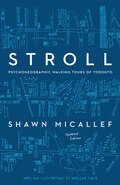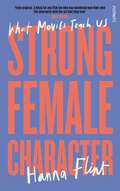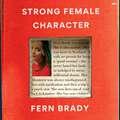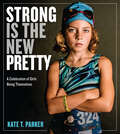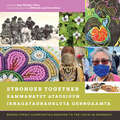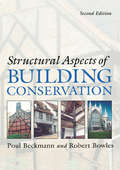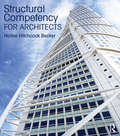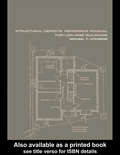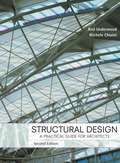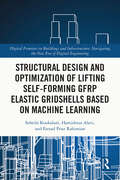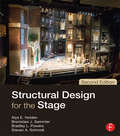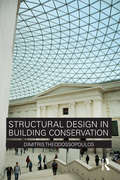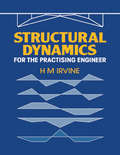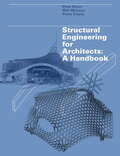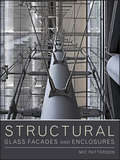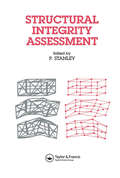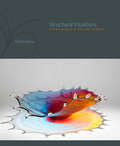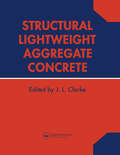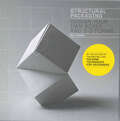- Table View
- List View
Strokes of Genius: The Best of Drawing (Strokes of Genius: The Best of Drawing #8)
by Rachel Rubin WolfAwe-inspiring works by contemporary masters, along with the secrets behind its creation.Drawing is the most intimate and immediate form of self-expression, fundamental to every artist's ability to communicate with a viewer. The sense of energy and expression that can be captured in mere strokes of charcoal, ink, pastel, marker or any of the other modest mediums proudly represented in this book is astounding.A glowing celebration of the art of drawing, Strokes of Genius features styles ranging from meticulous realism to imaginative flights of fancy, from lyrical sketches created in minutes to intricately layered renderings that took months to complete.Includes:169 stand-out examples of the finest drawing being done today, selected from hundreds of submissions from around the world.An impressive range of styles, materials and techniques covering a wide array of subjects, including still life, the figure, animals, landscapes, portraits and more.Comments from the artists offer firsthand insight on the creation of each artwork, diverse perspectives on drawing, and fresh ideas and techniques.An incomparable source of inspiration and delight for artists and art lovers, Strokes of Genius contains hundreds of combined years of expertise, artistic breakthroughs and, above all, remarkable drawings that leave a lasting impression.
Strokes of Genius: Value - Lights & Darks (Strokes of Genius: The Best of Drawing #6)
by Rachel Rubin WolfAwe-inspiring works by contemporary masters, along with the secrets behind its creation.Drawing is the most intimate and immediate form of self-expression, fundamental to every artist's ability to communicate with a viewer. The sense of energy and expression that can be captured in mere strokes of charcoal, ink, pastel, marker or any of the other modest mediums proudly represented in this book is astounding.A glowing celebration of the art of drawing, Strokes of Genius features styles ranging from meticulous realism to imaginative flights of fancy, from lyrical sketches created in minutes to intricately layered renderings that took months to complete.Includes:169 stand-out examples of the finest drawing being done today, selected from hundreds of submissions from around the world.An impressive range of styles, materials and techniques covering a wide array of subjects, including still life, the figure, animals, landscapes, portraits and more.Comments from the artists offer firsthand insight on the creation of each artwork, diverse perspectives on drawing, and fresh ideas and techniques.An incomparable source of inspiration and delight for artists and art lovers, Strokes of Genius contains hundreds of combined years of expertise, artistic breakthroughs and, above all, remarkable drawings that leave a lasting impression.
Stroll, updated edition: Psychogeographic Walking Tours Of Toronto
by Shawn MicallefTHE TORONTO STAR'S "30 BOOKS WE CAN'T WAIT TO READ THIS SPRING"The updated edition of a Toronto favourite meanders around some of the city’s unique neighborhoods and considers what makes a city walkable What is the 'Toronto look'? Glass skyscrapers rise beside Victorian homes, and Brutalist apartment buildings often mark the edge of leafy ravines, creating a city of contrasts whose architectural look can only be defined by telling the story of how it came together and how it works, today, as an imperfect machine.Shawn Micallef has been examining Toronto’s streetscapes for decades. His psychogeographic reportages situate Toronto's buildings and streets in living, breathing detail, and tell us about the people who use them; the ways, intended or otherwise, that they are being used; and how they are evolving.Stroll celebrates Toronto's details – some subtle, others grand – at the speed of walking and, in so doing, helps us to better get to know its many neighbourhoods, taking us from well-known spots like the CN Tower and Pearson Airport to the overlooked corners of Scarborough and all the way to the end of the Leslie Street Spit in Lake Ontario."Shawn Micallef is the unofficial mayor of Toronto, the genial ambassador the city needs and deserves. As he strolls Toronto’s broad avenues and its little streets, he finds hidden pockets of delight – and weirdness, too. Join him and fall in love with the city again." – Liz Renzetti, author of Bury the Lead"When I moved to Toronto in 2011, Stroll was the first book I added to my library and course reading lists. My students and I get lost in the PATH, sneak into lobbies, and visit the archives with this book as our guide. Micallef’s friendly voice invites us to slow down and notice not just a few landmark buildings but the city’s built fabric as a whole. This updated version offers our collective memory a much-needed affectionate yet critical view of recent changes to the city." – Erica Allen-Kim, Author of Building Little Saigon"Stroll is a delightful and eccentric guidebook, full of clever writing, amusing stories and charming maps that will make you want to strap on your walking shoes and head into the streets of Toronto." – Carol Off, Author/Broadcaster"Shawn Micallef looks at the city in a way we all should more often – he sees it as a living book that is alive with stories just waiting to be told to the attentive observer. In Stroll, he gives us an introduction to just how interesting and surprisingly dramatic those stories are, and how exciting our city is when we hear them." – David Crombie, former mayor of Toronto"A smart and intimate guide to the city that makes you feel like an insider from start to finish." – Douglas CouplandThis new edition updates things in the city that have changed and includes several new walks.
Strong Female Character
by Hanna FlintLeading film critic of her generation offers an unflinchingly honest and humorous account of her millennial journey towards self-acceptance through a cinematic lens.Hanna Flint speaks from the heart in Strong Female Character, a personal and incisive reflection on how cinema has been the key to understanding herself and the world we live in. A staunch feminist of mixed-race heritage, Hanna has succeeded in an industry not designed for people like her. Interweaving anecdotes from familial and personal experiences - episodes of messy sex, introspection, and that time actor Vincent D'Onofrio tweeted that Hanna Flint sounded 'like a secret agent' - she offers a critical eye on the screen's representation of women and ethnic minorities, their impact on her life, body image and ambitions, with the humour and eloquence that has made her a leading film critic of her generation. Divided into the sections Origin Story, Coming of Age, Adult Material, Workplace Drama and Strong Female Character, the book ponders how the creative industries could better reflect our multicultural society. Warm, funny and engaging and full of film-infused lessons, Strong Female Character will appeal to readers of all backgrounds and seeks to help us better see ourselves in our own eyes rather than letting others decide who and what we can be.
Strong Female Character: Nero Book Awards Winner
by Fern BradyBRITISH BOOK OF THE YEAR: AUDIOBOOK WINNER 2024NERO BOOK AWARDS WINNER 2023WINNER, NON FICTION BOOK 2023, BOOKS ARE MY BAG AWARDSSHORTLIST, BOOKSHOP.ORG INDIE CHAMPIONSSHORTLIST, AMAZON NON-FICTION BOOK OF THE YEARSHORTLIST, GOODREADS CHOICE BOOK OF THE YEARAudible Books of the Year 2023The Times Books of the Year 2023Apple Best Audiobooks of 2023BOOKSHOP.ORG Book of the Month January 2024THE SUNDAY TIMES BESTSELLER'I tore through this hilarious, smart, sad, revealing book' - Bob Odenkirk'Funny, sharp and has incredible clarity' - Jon Ronson'An absolute riot. I'm literally going to read it again once I've finished, and I'm a miserable bastard...it's a belter' - FRANKIE BOYLE'Strong Female Character is a testament to the importance of self-knowledge.' - Rachael Healy, The GuardianA summary of my book:1. I'm diagnosed with autism 20 years after telling a doctor I had it.2. My terrible Catholic childhood: I hate my parents etc.3. My friendship with an elderly man who runs the corner shop and is definitely not trying to groom me. I get groomed.4. Homelessness.5. Stripping.6. More stripping but with more nervous breakdowns.7. I hate everyone at uni and live with a psycho etc.8. REDACTED as too spicy.9. After everyone tells me I don't look autistic, I try to cure my autism and get addicted to Xanax.10. REDACTED as too embarrassing.'Fern's book, like everything she does, is awesome. Incredibly funny, and so unapologetically frank that I feel genuinely sorry for her lawyers.' - PHIL WANG'Of course it's funny - it's Fern Brady - but this book is also deeply moving and eye-opening'- ADAM KAY'It made me laugh out loud and broke my heart and made me weep...I hope absolutely everyone reads this, and it makes them kinder and more curious about the way we all live' - DAISY BUCHANAN'Glorious. Frank but nuanced, a memoir that doesn't sacrifice voice or self-awareness. And it has brilliant things to say about being autistic and being funny' - ELLE MCNICOLL'A set text for all of us in 2023' - DEBORAH FRANCES-WHITE'Fern is a brilliant, beautiful writer with a unique voice and even more unique story. Astute, honest and very, very funny.' - LOU SANDERS'So funny and brilliant' - HOLLY SMALE'Witty, dry, and gimlet-eyed, Strong Female Character is a necessary corrective. Brady offers a compelling, messy, highly resonant portrait of what masked Autism feels like.' - Devon Price, author of Unmasking Autism
Strong Female Character: The Sunday Times Bestseller
by Fern BradyFern Brady was told she couldn't be autistic because she's had loads of boyfriends and is good at eye contact. This is a story of how being female can get in the way of being autistic and how being autistic gets in the way of being the 'right kind' of woman.(p) 2023 Octopus Publishing Group
Strong Is the New Pretty: A Celebration of Girls Being Themselves
by Kate T. ParkerGirls being fearless. Girls being silly. Girls being wild, stubborn, and proud. Girls whose faces are smeared with dirt and lit up with joy. So simple and yet so powerful, Strong Is the New Pretty celebrates, through more than 175 memorable photographs, the strength and spirit of girls being 100% themselves. Real beauty isn’t about being a certain size, acting a certain way, wearing the right clothes, or having your hair done (or even brushed). Real beauty is about being your authentic self and owning it. Kate T. Parker is a professional photographer who finds the real beauty in girls, capturing it for all the world to see in candid and arresting images. A celebration, a catalog of spirit in words and smiles, an affirmation of the fact that it’s what’s inside you that counts, Strong Is the New Pretty conveys a powerful message for every girl, for every mother and father of a girl, for every coach and mentor and teacher, for everyone in the village that it takes to raise a strong and self-confident person.
Stronger Together / Kammanatut Atausigun / Iknaqataghaghluta Qerngaamta: Bering Strait Communities Respond to the COVID-19 Pandemic
by Amy Phillips-ChanA collection of first-person narratives offering a vivid, nuanced look at the lived and shared experiences of Bering Strait communities in the COVID-19 era, Stronger Together is a unique collaboration between the Carrie M. McLain Memorial Museum in Nome, Alaska, and over forty community members, artists, and poets from across the Bering Strait region. The featured artists narrativize works inspired by the pandemic, from walrus ivory masks and sealskin face coverings to scenes of subsistence activities and informal family portraits. Full-color illustrations enliven the text with vibrant images of local community members, activities, and artwork from those who call this northern expanse of rolling tundra and icy seas home. Stronger Together features hopeful and redemptive behind-the-scenes perspectives of how remote Alaskan communities endured the COVID-19 pandemic and appeals to anyone looking for hopeful and redemptive stories of this time, as well as museum, public arts, and culture program administrators; student and scholars of Indigenous and Alaska Native languages and culture; the Alaska anthropology community; artists and art enthusiasts; and those with a general interest in Alaska.
Strongsville (Images of America)
by Bruce M. CoureyStrongsville was originally organized in 1818 as Strongsville Township, named for its founder, John Stoughton Strong, and comprised of a 25-square-mile area of the Connecticut Western Reserve. The first roads, schools, churches, mills, and taverns emerged soon after, and the township's population grew to 297 by 1820. For 120 years, up until World War II, farming and agriculture characterized the area. Incorporated as a village in 1927 and as a city in 1961, Strongsville underwent dramatic evolution and growth during the last quarter of the 20th century, particularly under the leadership of longtime mayor Walter F. Ehrnfelt. Strongsville has grown from a quiet, rural town into one of northeastern Ohio's largest and most vibrant communities. It is known throughout the Greater Cleveland area as a community that offers its residents all the amenities of a large municipality while maintaining its small-town charm.
Structural Aspects of Building Conservation
by Poul Beckmann Robert BowlesThis practical guide to the assessment and repair of historic buildings is invaluable for structural engineers, architects, surveyors and builders working in all aspects of building conservation. Taking a practical step-by-step approach, the authors discuss the appraisal of buildings and the differences in structural behaviour between new and existing structures. Each stage in the appraisal is explained, using examples from the authors' own work. Each major construction material is assessed in detail, with separate sections on masonry, concrete, timber and the particularly complex issues of iron and steel framed buildings. Techniques for testing the ability of a building to continue its existing use or to be converted to a new use are explained.
Structural Competency for Architects
by Hollee Hitchcock BeckerStructural Competency for Architects is a comprehensive volume covering topics from structural systems and typologies to statics, strength of materials, and component design. The book includes everything you need to know about structures for the design of components, as well as the logic for design of structural patterns, and selection of structural typologies. Organized into six key modules, each chapter includes examples, problems, and labs, along with an answer key available on our website, so that you learn the fundamentals. Structural Competency for Architects will also help you pass your registration examinations.
Structural Defects Reference Manual for Low-Rise Buildings
by Michael F. AtkinsonThe Structural Defects Reference Manual for Low-Rise Buildings has been written to assist professionals and students involved in building construction to identify causes of structural failure. Each chapter carefully addresses design, materials and workmanship factors which contribute to structural defects. The main structural elements - roofs, wall
Structural Design
by James R. Underwood Michele ChiuiniWritten for the practicing architect, Structural Design addresses the process on both a conceptual and a mathematical level. Most importantly, it helps architects work with structural consultants and understand all the necessary considerations when designing structural systems. Using a minimum of simple math, this book shows you how to make correct design calculations for structures made from steel, wood, concrete, and masonry. What?s more, this edition has been completely updated to reflect the latest design methods and codes, including LRFD for steel design. The book was also re-designed for easy navigation. Essential principles, as well as structural solutions, are visually reinforced with hundreds of drawings, photographs, and other illustrations--making this book truly architect-friendly.
Structural Design and Optimization of Lifting Self-forming GFRP Elastic Gridshells based on Machine Learning (Digital Frontiers in Buildings and Infrastructure)
by Farzad Pour Rahimian Hamidreza Alavi Soheila KookalaniStructural Design and Optimization of Lifting Self-forming GFRP Elastic Gridshells Based on Machine Learning presents the algorithms of machine learning (ML) that can be used for the structural design and optimization of glass fiber reinforced polymer (GFRP) elastic gridshells, including linear regression, ridge regression, K-nearest neighbors, decision tree, random forest, AdaBoost, XGBoost, artificial neural network, support vector machine (SVM), and six enhanced forms of SVM. It also introduces interpretable ML approaches, including partial dependence plot, accumulated local effects, and SHaply additive exPlanations (SHAP). Also, several methods for developing ML algorithms, including K-fold cross-validation (CV), Taguchi, a technique for order preference by similarity to ideal solution (TOPSIS), and multi-objective particle swarm optimization (MOPSO), are proposed. These algorithms are implemented to improve the applications of gridshell structures using a comprehensive representation of ML models. This research introduces novel frameworks for shape prediction, form-finding, structural performance assessment, and shape optimization of lifting self-forming GFRP elastic gridshells using ML methods. This book will be of interest to researchers and academics interested in advanced design methods and ML technology in architecture, engineering, and construction fields.
Structural Design for the Stage
by Alys Holden Bronislaw Sammler Bradley L Powers Steven A SchmidtThe follow-up to the 2000 Golden Pen Award-winning Structural Design for the Stage, this second edition provides the theater technician with a foundation in structural design, allowing an intuitive understanding of "why sets stand up." It introduces the basics of statics and the study of the strength of materials as they apply to typical scenery, emphasizing conservative approaches to real world examples. This is an invaluable reference for any serious theatre technician throughout their career, from the initial study of the fundamental concepts, to the day-to-day use of the techniques and reference materials. Now in hardcover, with nearly 200 new pages of content, it has been completely revised and updated to reflect the latest recommended practices of the lumber and steel industries, while also including aluminum design for the first time.
Structural Design in Building Conservation
by Dimitris TheodossopoulosNo building is properly conserved if it is not structurally sound. Consequently architects, engineers and conservation officers need an adequate grounding in the technology, the materials and the historic origins of the building in order to complete a conservation project successfully. Structural Design in Building Conservation deals with design issues and technical choices, showing how they are integrated with the planning and architectural outcomes in a conservation project. It brings together theory with current conservation technology, discussing the possibilities of structural details and strategies in architectural expression. Case studies are central to this, and these are organised around such themes as the addition of roofs, requalification of space, strengthening and re-use of fabric, repristination, additions, completions, stiffness adjustments, and the correction of past mistakes. The reader is encouraged to examine the technical details of these real projects, and explore the possible solutions. The philosophy of structural interventions is introduced in the context of conservation theories and practices in various European countries. The main types of strengthening, repairs and interventions are explained using different building types, and the structural nature of the main elements to be strengthened (linear structures, frames, plates and shells) is explored in detail. Case studies included cover a very wide range of historic types and conversions, not only monumental masonry structures like neoclassical buildings, major temples, churches, public buildings and museums, but also more utilitarian structures like historic mills, early reinforced concrete structures and vaulting types. This is essential reading for all students of architectural conservation, and practicing architects and engineers who are involved in conservation projects.
Structural Dynamics
by Martin WilliamsDynamics is increasingly being identified by consulting engineers as one of the key skills which needs to be taught in civil engineering degree programs. This is driven by the trend towards lighter, more vibration-prone structures, the growth of business in earthquake regions, the identification of new threats such as terrorist attack and the increased availability of sophisticated dynamic analysis tools.Martin Williams presents this short, accessible introduction to the area of structural dynamics. He begins by describing dynamic systems and their representation for analytical purposes. The two main chapters deal with linear analysis of single (SDOF) and multi-degree-of-freedom (MDOF) systems, under free vibration and in response to a variety of forcing functions. Hand analysis of continuous systems is covered briefly to illustrate the key principles. Methods of calculation of non-linear dynamic response is also discussed. Lastly, the key principles of random vibration analysis are presented – this approach is crucial for wind engineering and is increasingly important for other load cases. An appendix briefly summarizes relevant mathematical techniques. Extensive use is made of worked examples, mostly drawn from civil engineering (though not exclusively – there is considerable benefit to be gained from emphasizing the commonality with other branches of engineering). This introductory dynamics textbook is aimed at upper level civil engineering undergraduates and those starting an M.Sc. course in the area.
Structural Dynamics for the Practising Engineer
by H.M. IrvineStructural dynamics is a complex and increasingly important field of civil/structural engineering. The aim of this concise book is to demonstrate to practising engineers and advanced students that the dynamic response of structural systems can be understood without advanced techniques of analysis and impenetrable detail.
Structural Engineering for Architects
by Peter EvansThis book provides an understanding of the fundamental theories and practice behind the creation of architectural structures. It aids the development of an intuitive understanding of structural engineering, bringing together technical and design issues. The book is divided into four sections: 'Structures in nature' looks at structural principles found in natural objects. 'Theory' covers general structural theory as well as explaining the main forces in engineering. 'Structural prototypes' includes examples of modelmaking and load testing that can be carried out by students. The fourth section, 'Case studies', presents a diverse range of examples from around the world – actual buildings that apply the theories and testing described in the previous sections.This accessible, informative text is illustrated with specially drawn diagrams, models, CAD visualizations, construction details and photographs of completed buildings. This book will give students and newly qualified architects a firm grasp of this essential topic.
Structural Engineering for Architects: A Handbook
by Peter Evans William McLean Pete SilverThis book provides an understanding of the fundamental theories and practice behind the creation of architectural structures. It aids the development of an intuitive understanding of structural engineering, bringing together technical and design issues. The book is divided into four sections: 'Structures in nature' looks at structural principles found in natural objects. 'Theory' covers general structural theory as well as explaining the main forces in engineering. 'Structural prototypes' includes examples of modelmaking and load testing that can be carried out by students. The fourth section, 'Case studies', presents a diverse range of examples from around the world – actual buildings that apply the theories and testing described in the previous sections.This accessible, informative text is illustrated with specially drawn diagrams, models, CAD visualizations, construction details and photographs of completed buildings. This book will give students and newly qualified architects a firm grasp of this essential topic.
Structural Glass Facades and Enclosures
by Mic PattersonA comprehensive guide to structural glass facades for architects,engineers, and builders Once an experimental building form, structural glass facadeshave matured into a fully robust technology. Structural GlassFacades and Enclosures documents, defines, and categorizes thecurrent state of the art in long-span glass facade design andconstruction, with a focus on structural systems, glass claddingoptions, and implementation strategies for innovative design. Acomparative analysis of these various systems is included, alongwith designs and design practices for enhancing transparency;engineering issues; material, process, and fabricationconsiderations; installation means and methods; and projectdelivery strategies for implementing innovative building technologyin today's construction marketplace. The reader will findinformation here that is not available together in any singleresource, including:Structural system types and design options, with integratedglass system options and their application on each of thestructural typesAn in-depth discussion of design, fabrication, and installationissues relative to each system type, accompanied by illustrationsand photographsA discussion of the challenges of implementing innovative designand technology in the construction industry, and operationalpractices to improve the probability of successA series of in-depth case studies documenting representativesamples of stunning built works that employ the technology anddesign principles identified in the bookStructural Glass Facades and Enclosures provides expertcontent for putting cutting-edge technology into real-lifepractice, creating new potential for fresh applications embracingboth aesthetic and performance solutions, and for the adoption ofthe technology by architects, builders, and facadepractitioners.
Structural Integrity Assessment
by P. StanleyThe assessment of structural integrity is a vitally important consideration in many fields of engineering, which has an influence on the full range of professional activities from conception, design and analysis, through operation to residual life evaluation and possible life extension. In devising satisfactory procedures for this purpose there is
Structural Intuitions: Seeing Shapes in Art and Science (Page-Barbour Lectures)
by Martin Kemp"All great achievements of science must start from intuitive knowledge," wrote Albert Einstein. In Structural Intuitions, a fascinating exploration of the commonalities between two seemingly disparate realms, renowned art historian Martin Kemp applies Einstein's notion both to science and to art. Kemp argues that in both fields, work begins at the intuitive level, curiosity aroused by our recognition of patterns or order. Kemp's "structural intuitions," then, are the ways we engage fundamental perceptual and cognitive mechanisms to bring order to our observed world. Through stimulating juxtaposition, Kemp considers connections between naturally occurring patterns, cognitive processes, and artistic and scientific expression, drawing on an array of examples from the Renaissance through the present. Taking a broadly historical approach, Kemp examines forms and processes such as the geometry of Platonic solids, the dynamics of growth, and the patterns of fluids in motion, while placing the work of contemporary artists, engineers, and scientists in dialogue with that of visionaries such as Leonardo da Vinci and D'Arcy Thompson. Richly illustrated, lucidly written, and wonderfully thought-provoking, Structural Intuitions is essential reading for anyone seeking insight into common ground in the arts and sciences.
Structural Lightweight Aggregate Concrete
by John L. ClarkeLightweight aggregate concrete is undergoing something of a renaissance. Although this material has been available for many years, only now is it being used more widely. This book provides a comprehensive review of this growing field from an international perspective.
Structural Packaging: Design Your Own Boxes And 3d Forms
by Paul JacksonUnlike other packaging titles, which simply provide templates to copy, this book enables designers of all packaging types to create 3-D packaging forms that are specific to their needs rather than based on an existing design. It teaches a simple ‘net’ construction system – a one-piece 2-D configuration of card seen when a 3-D package is opened out and flattened – which enables the designer to create a huge number of very strong 3-D packaging forms that are both practical and imaginative. Each chapter concludes with photographs and net drawings of 6–10 creative examples of packaging designs made using the principles outlined in the preceding chapter. Structural Packaging gives the reader an understanding of the underlying principles of packaging construction and the technical knowledge and confidence to develop a greater number of their own unusual and innovative designs than any comparable book.Download the crease diagrams from the book for free at www.laurenceking.com


